The season finale of The Great British Bake Off was the third most popular programme on television last year – outflanked only by two World Cup football matches. The final episode of this season, airing tomorrow, will in all likelihood be the most-watched show of 2015. Over the last five years, in fact, Bake Off has so thoroughly entangled itself with the consciousness of the nation that it has become easy to forget how very, very strange it is that 10 million Britons switch on their TV sets each Wednesday evening to watch a baking contest filmed in a tent in the countryside.
No one predicted the scale of its success. Richard McKerrow and Anna Beattie, who founded Love Productions, which makes the show, tried to sell the idea for four years before BBC2 finally picked it up. Their original inspiration, they told me, was the rural baking competition at a village fete; they liked the idea that bakers were naturally generous – making delicious things for others. And they felt that baking said much about Britain and its regional quiddities, from Dundee cakes to bara brith to Bakewell tarts. But their pitch was repeatedly passed over, for the perfectly understandable reason that TV commissioners felt that watching people make cakes would be unutterably dull. Imagine that someone had told you in 2009 that by 2015 the great television success would be a baking competition presented by two decidedly unglitzy middle-aged women, one of them gay, and judged by an octogenarian cookbook writer and a Liverpudlian professional baker of whom you had never heard. You might have cheered for the sisterhood, but you probably wouldn’t have believed it.
Much of the tone of the show – as light and sweet as a sponge – is carried by its presenters, the impish Sue Perkins and Mel Giedroyc, and their end-of-pier, Carry On-style humour. “I’ve never eaten a nun before,” Sue remarked solemnly after the contestants were set the task of making a French choux pastry called a religieuse. If Mel and Sue give Bake Off its wit, the judges – the grandmotherly, somewhat patrician Mary Berry and the flinty-but-twinkly master baker Paul Hollywood – are its twin deities. “Alvin has really got to pull up his socks,” is a typically nannyish remark from Mary, who reacts to baking disasters more in sorrow than in anger; “Queen Victoria would be proud” represents the zenith of her lexicon of praise.
Paul and Mary treat each other with an indulgent respect, across a gaping class divide. Squarely built, Paul has a particular way of standing: legs apart, shirt cuffs tucked once over his sleeves, hands on hips. He employs a Paddington stare through narrowed, Arctic-blue eyes to impart scepticism when bakers head off on the wrong track – daring to introduce gritty pomegranates to a silky bavarois, for instance.
The rules of the show are simple. At the beginning of the series, 12 amateur bakers are introduced to viewers. Each week is designated a broad theme: bread, say, or pastry, or desserts. Within the hour-long show (compressed from a weekend of filming), bakers compete in three rounds, after which the weakest is dispatched and the strongest accorded the title “star baker”. This continues until three bakers are left, when the grand final unfolds. For the viewer, an hour in the Bake Off tent is like peeping through the window into a charmed land of plenty: a fairytale landscape of tottering choux towers, charlotte russes filled with trembling expanses of bavarois, gingerbread houses and cheesecake tiers and lady fingers and sponges and macarons and frangipanes. But the competition throbs with drama. Will the sponge sink? Will the custard split? Will the ice cream melt? Has the doe-eyed, bashful junior doctor Tamal Ray, one of this year’s finalists, used the strong flour necessary (it turns out!) to make eclairs that are sturdy enough to hold the weight of a further tier of iced eclairs? Will prison governor Paul Jagger underbake his eclairs, causing them to be soft, and bend – “which would be ghastly”, in Mary’s words?
In the moment of watching, I find myself punching the air, or gasping in excitement, or clutching at my head in despair. The characters might be attempting to scale a mountain or swim an ocean, so badly does one begin to care about their fates. As the series progresses, one begins to recognise their particularities. A nation’s eyes rolled when Ian Cumming, another of this season’s finalists, declared that he was baking with eggs laid by his own guinea fowl: of course he fashioned his own device to cut lady fingers to precisely 9cm long; of course it was he who constructed a wellhead from tempered chocolate with a bucket that drew a lemon-flavoured, white chocolate drink from its depths. It was the moment when Tamal affixed crescent moons and delicate pastry roses – inspired by the Arabian Nights and Persian gardens – to his raised game pie that I really fell for him. When Nadiya Hussain, lip trembling with trepidation, presented her sculpted chocolate peacock to the judges (and secured her own route to the final), I cried.

Bake Off is rapturous, it is agonising, it is hilarious. And yet, how minuscule and how utterly ridiculous, after all. This is an economy of minor anxieties and insignificant dangers: the emotional range of a comfortable life, fretted by quotidian storms – a parking ticket, a stressful day at work, a forgotten lunch date. Bake Off validates the small quiet dramas of the trifling everyday.
None of this has come about by chance. The Bake Off formula has developed and matured since its debut in 2010. In season one, the mix was a little stodgy. The tent travelled around the country, sometimes pitched (implausibly, it now seems) in carparks, with passersby peeking in. Mel and Sue were not quite funny, yet, and much of their job consisted of interviewing food experts (six alone in the first episode) for lengthy exegeses of baking history. Mary, limp-haired, had not yet been given the casual-chic wardrobe of bright, tailored jackets and jeans. In season two, the format began to firm up: the star baker idea was introduced, and Mel and Sue began to chant: “Ready, get set, bake” before each challenge. It was in season two that Bake Off really took off on Twitter, when the camera lingered for a second on a squirrel displaying a pair of enormous testicles, a cause of enormous hilarity among the commentariat.
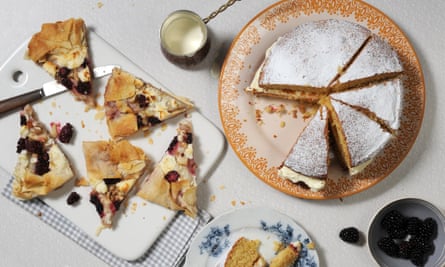
In season four there was an all-female final with a memorable cast: the designer Frances Quinn, who was always having “ideas”; the confident, self-assured Kimberley Wilson, who, to no one’s surprise, knew a word in Japanese for the notion of always being able to push yourself beyond your apparent limits; the coltishly beautiful Ruby Tandoh, who flavoured her bakes with a brooding melancholy. (Sue: “You’re studying Wittgenstein!” Ruby: “That’s nothing compared to this.”)
The programme makers only gradually learned to set tasks pleasing to the eye: in the first season, one challenge consisted of making three puddings, one with bread, one with suet, and a crumble – brown blobs in Pyrex dishes. Over time, challenges became more perilously architectural – a croquembouche (choux puff tower) in season two, and in season three a gingerbread building (the eventual winner, John, re-created the Roman Colosseum). Season five’s final saw the construction of a cake-and-sugar coal mine, complete with winding gear. That series contained a full-on tabloid scandal when one contender, Diana Beard, was widely accused of sabotage when she removed an alaska, not hers, from a freezer. (It belonged to Iain Watters, and he presented his ruined pudding to the judges from the murky depths of a fliptop bin, whither he had cast it in a fury; this event was even more scandalous than the custard theft of 2013 – don’t ask.)
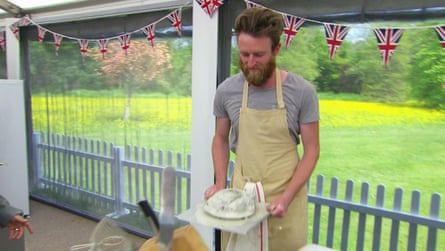
Bake Off is, in fact, as much about a secondary discourse played out in the press and social media as it is about the show itself. This conversation has been harnessed by the BBC itself, with its cheery spinoff show An Extra Slice, presented by comedian Jo Brand, in which “celebrity fans” gather to discuss the preceding week’s events in a studio carefully styled to resemble the Bake Off tent. At the time of writing, the Daily Telegraph had published 73 articles about the programme since 1 August; supermarket aisles groan with muffin tins and piping bags and cake stands come Bake Off season. The show has shrugged off the bonds of mere TV, and garnered a cultural presence rarely seen since the shows of the 1970s – the so-called “golden age” of television.
The Great British Bake Off is a fully fledged cultural phenomenon – and it may be the perfect show for Britain, now. We exist in a world where the difficult words “Great” and “British” cannot safely be applied to much. But they can be applied to a baking contest.
In the summer of 2009, the year before Bake Off first aired, Britain was reeling from the financial crisis. One sunny Manchester morning, Jeremy Deller – an artist who put flower arrangements made by members of the Women’s Institute in the Tate – staged a procession, complete with embroidered banners and lovingly decorated floats, that he had created with members of the local community. The following day, the artist Antony Gormley began a project in which members of the public occupied the normally empty fourth plinth in the northwest corner of Trafalgar Square, London: for an hour at a time they sang, or danced, or simply enjoyed their time in the sun (or rain). The project had been conceived long before the crash, and in more prosperous times, might have stood as a monument to vainglorious individuality. As it was, it had a kind of unforced charm; it became a celebration of ordinariness.
There was a new spirit in the land, one that had been quietly gathering strength in the boom years, and found new resonance in a post-crash Britain. Knitting circles became chic. New branches of the Women’s Institute, hitherto firmly associated in the national imagination with the dowdy, jam-making elders of rural communities, began to be founded by thirtysomethings in fashionable urban neighbourhoods. (A branch calling itself the Shoreditch Sisters, set up in 2007, has concerned itself with crocheting protest signs and campaigning against female genital mutilation.)
To the cynical, such activities represented self-deception and false consciousness: people used to knit clothes because they couldn’t afford to buy them, not as some kind of folksy hobby. The knitters, by and large, seemed to recognise that. The activity was simultaneously a knowing re-creation of something that might never have quite existed, and a sincerely enjoyed, personally enriching, everyday act of creativity. This is the spirit that Love Productions has so successfully mined – the way in which these small daily acts, if you only looked at them afresh, might become extraordinary. They have followed the success of Bake Off with The Great British Sewing Bee and, coming this autumn to BBC2, The Great British Pottery Throwdown.
The Bake Off may have appealed to a nation that, in economically bleak times, cleaved to domestic comforts, but it has also tapped into a plangent sense of Britishness, one that recalls some unspecified and ungraspable past. The tent is calculated to recall the marquees of the rural flower and produce show. The set dressing, in each series more skilfully achieved, waxes nostalgic, in the carefully manufactured way of Cath Kidston, the designer of floral tea towels and spotty cushion covers. The contestants work in their own mini kitchen islands, wooden-topped units painted in pale ice-cream colours. Electric mixers are similarly pastel-coloured, as are the retro fridge-freezers. The walls are set about with union jack bunting, and at the front of the tent are tables with gingham cloths, little assemblages of wicker baskets to evoke a picnic outing from the 1950s, and eggshell-blue-painted dressers and chests adorned with china, enamel jugs and vintage bread bins.
The whole aesthetic evokes the notion of the cheerful farmhouse kitchen, despite bearing no resemblance to the dark, scruffy farm kitchens I remember from growing up in the country – cats perched on dog-eared piles of Farmers Weekly, shelves lined with ancient, grimy newspaper. It is important that Bake Off is not set in the antiseptic surroundings of an urban studio, but rather in a carefully chosen and people-free landscape, which can be glimpsed through the windows of the marquee. (This year and last it has been pitched in the gardens of Welford Park near Newbury in Berkshire.) This is the English countryside in all its May-time loveliness – which the viewer actually watches months later, as they contemplate damp September – to be admired through lovingly filmed heads of cow parsley nodding under the weight of spring raindrops, or via long shots of fields of buttercups.
Bake Off is pure English pastoral: it is Delius, Vaughan-Williams and Blake. It is Miss Marple. It is the National Trust. It is the first tableau in Danny Boyle’s opening ceremony for the 2012 London Olympics: a village cricket match played out in a green and pleasant land. It is the England that then prime minister John Major vowed would never vanish in a famous 1993 speech: “Long shadows on county grounds, warm beer, invincible green suburbs, dog lovers and pools fillers and – as George Orwell said – ‘old maids bicycling to holy communion through the morning mist’.” Major was mining Orwell’s wartime essay The Lion and the Unicorn, whose tone was one of reassurance – the national culture will survive, despite everything: “The gentleness, the hypocrisy, the thoughtlessness, the reverence for law and the hatred of uniforms will remain, along with the suet puddings and the misty skies.”
Orwell and Major were both asserting the strength of a national culture at times when Britishness – for both men basically Englishness – was felt to be under threat from outside dangers (war, integration into Europe). The Bake Off tent operates similarly. There it sits, in inviolable splendour, a blessed plot, an island amid a sea of green. Into this demi-paradise the dangerous clamour of less happy lands cannot intrude. The tent stands in for a utopian little Britain in which all – the firefighter, the student, the grandmother, the doctor, the nurse, the prison governor, the full-time mother, the musician – exist in harmony. This little world is rather middle-class (some people in the real world are too posh to bake, some too impoverished, and they are not in the tent). It is a world in which any number of distinctions have been erased, and many pressing and anxious-making things are left outside. In the real world, Tamal may tweet about the iniquities of the government’s contracts for junior doctors, but this side of him is never expressed in the tent, just as it is unthinkable that Paul-the-prison-governor might so much as mention the criminal justice system. It is, of course, a wish-fulfillment, this equalising Albion of common purpose, meritocratic effort and vanished difference. But how delightful and seductive it is, this little world, where all that matters is the rise of your sponge.

Which is not to say that the multiculturalism of the tent is unimportant: Nadiya is the first British woman who wears a hijab to have occupied such a positive, joyous role in British mass culture. On Monday, prime minister David Cameron was reported as backing her to win, praising her “coolness under pressure”. Merely by making meringues she may have done wonders for interfaith harmony. The brilliance of the ideology of the Bake Off tent is that it works whatever one’s political persuasion. The Mail may have complained about “politically correct” multiracial casting but there’s enough of old England (leave alone the patriotic title) to please the conservative and the Conservatives.
When we spoke, Anna Beattie downplayed the matter of casting, as if it came about quite naturally. (Simon Evans, the show’s editor, on the other hand, paid tribute to the excellence of the casting team.) From thousands of applicants this year, around 150 were invited “to bake to camera, in front of us”, she explained. Not that many people are good at baking both bread and cakes, she said, and there is an even smaller number who can bake and talk simultaneously. Those who came across as “wannabes” – keener on celebrity than baking – were also discarded. Having winnowed the applicants down to those who baked best on the screen test, “then it was about trying to get a representative mix”. “Representative of what?” I asked. “I don’t know,” she replied. “Britain?”
Quintessentially British though it may appear, Bake Off is also a successful export. Kate Phillips, whose team at BBC Worldwide has sold Bake Off into 21 territories, told me that she calls it a “sweet-spot” format: its essentials are extremely simple – a tent, a presenter or two, a couple of judges, some amateur bakers – which means local versions can be made very cheaply by “broadcasters desperate to fill their schedules”. Those who buy rights to the programme abroad also get the secrets of the recipe – the “format bible”. So it is that the planet is sprinkled with Bake Off’s international cousins, each with its recognisable elements and local variants. (The BBC makes a modest fee from each sale, but it is Love, as the programme-maker, that reaps most of the cash.)
In France, Le Meilleur Pâtissier (The Best Pastrychef) seems a slight oddity, given that France’s baking tradition is professional rather than domestic. (I have watched contestants perform the most peculiar challenge of baking “un cupcake géant” – since cupcakes are miniature cakes, it seemed to me that the contestants were, in fact, merely baking cakes.) Bake Off Italia is flirty and dramatic, set in beautiful formal gardens. The Scandinavians are keen on the format. They seem to favour lurid decoration (I watched a Danish chap on The Great Bake Fight produce an electric guitar formed of a blue-iced cake, presented in a guitar case). For The American Baking Competition, which also had Paul as a judge, there were Route 66 signs on the tent wall, and fist-pumping.
There is Bake Off in Turkey and Brazil, and in Thailand and Romania and Ukraine. What is most remarkable about these overseas versions is how they merge, chameleon-like, into their host cultures. Those apparently indelible signifiers of Britishness turn out, after all, to be evanescent. When I asked a Swedish friend what the tent, pastel kitchen units, and perky crockery displays in All of Sweden is Baking brought to mind, she replied, immediately: “Ikea and summer weekend cabins.” Phillips has not even lost hope of selling the format to China, which has no tradition of covered ovens, let alone baking – despite the fact that one broadcaster has turned her down on the grounds that Chinese audiences won’t watch a television programme “that makes you fat”.
Phillips also called Bake Off a “three-G show”, meaning that it appeals across the generations – “gold dust to a broadcaster”. Importantly, men watch it – and the fact that only football matches were more watched than Bake Off last year is significant. At a time when sports rights are spinning further beyond the BBC’s financial reach, shows such as Bake Off are more and more important to the corporation as broadcasting events around which families can gather. When I visited Richard McKerrow at Love’s cramped headquarters, he said: “I remember the third season. It would always be up against the Champions League. Then suddenly I noticed men on social networks saying, ‘I don’t know what to watch: the baking, or the football.’”
I asked Neil Crombie, the director of a Bafta-winning documentary about British taste presented by the artist Grayson Perry, for his professional view of Bake Off. I thought he might like it – but he regards it as a cultural irritant, he told me, to be classed along with “nationwide chains of supposedly individual gastropubs, and vintage fairs”. Bake Off, he argued, was designed to captivate the middle classes, playing on an endless capacity for self-deception: the show took a vulgar pleasure and gave it a sheen of respectability, drawing in people who would never watch The X Factor. He told me that he found the contrast between the “machine-tooled” production values of Bake Off and the artisanal skills it celebrated somewhat ironic. He pointed out that Love Productions – in which Sky bought a 70% stake last year – also made the controversial documentary Benefits Street, about communities subsisting on welfare: for him, the shows are flipsides of the same Daily Mail-ish coin: “The poor are going to hell in a handcart, but all is well in the village-hall vision of England.”
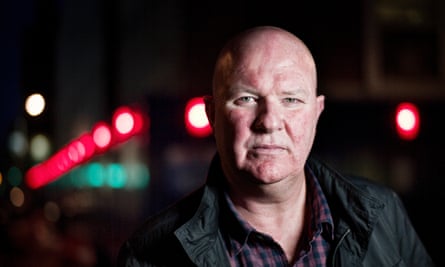
After speaking to Crombie I became slightly obsessed with the washing up on Bake Off. It is all done by hand by a “kitchen team”, Anna Beattie told me, in a service area at the end of the tent. Watching, I began to shift my gaze from the bakers to the work surfaces, counting all the utensils. During one technical challenge, I saw one baker use, at the very least, six glass bowls, a saucepan, a sieve, a spatula, a silicon sheet, spoons, a pastry brush, a skewer, a cake tin, palette knives, piping bags, a measuring jug, scissors, a rolling pin, spoons and a cooling rack. In the magical world of the Bake Off, mountains of dirty utensils vanish (watch the units closely when the technical bakes are brought up to the table for judging, and keep looking as the camera points back to the bakers on their stools awaiting the verdict). Some poor sod was out back, washing up.
The ultimate televisual ancestor of The Great British Bake Off was a jokey idea dreamed up back in 1988, at a condemned warehouse in the distant outreaches of east London. Here was the studio of a pioneering “youth TV” current affairs programme called Network 7 – a somewhat chaotic mix of reportage and stunts, broadcast Sunday mornings on Channel 4. That year, the 29-year-old Charlie Parsons became its editor, presiding over reporters even younger than himself. “There was a new way of thinking and writing about stories: high culture could be low and vice versa,” he told me.
Ideas meetings – a lot of ideas were needed to fill two hours each week – took place in a barge moored nearby. At one of these, a 22-year-old reporter named Murray Boland suggested a slightly wild notion that would eventually change the shape of mass-market TV.
Boland had moved to London from Ireland, where he had worked in radio on the Gay Byrne Show. There, they had run an item based on the SAS Survival Guide, a handbook to coping in hostile environments, which had been published in 1986. A group of people had been sent off to rural Connemara to fend for themselves using the guide. Each morning they rang into the show to report on their progress.
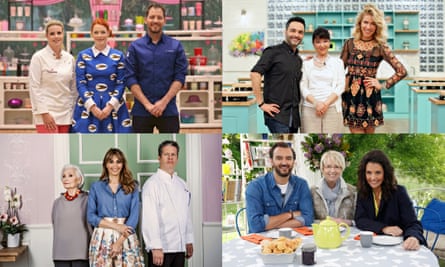
“The big turning point was the morning when they phoned in and said they had the previous night beaten a lamb to death with a rock in a sock,” Boland, who now runs a TV production company, recalled. “It ended up being debated in the Irish parliament as an extraordinary example of animal cruelty.” (The truth was that one of the participants, it later transpired, had prevailed upon a farmer to shoot and skin a lamb for them.) Boland ramped up the idea and presented it to Parsons: “What if we make this something where we send them to a desert island, people from different walks of life, and see who is the best equipped to survive?” Parsons went for it. A cast was assembled: the tennis player Annabel Croft, a stockbroker, a recent ex-convict, and a soap star. Boland found the island (amid a Sri Lankan mangrove swamp), wrote the scripts and reported as the participants “built crap shelters that leaked, and got terrible diarrhoea”.
The item did well, rather than spectacularly, but four years later, when he was running his own production company, the idea was still gnawing away at Parsons. He knew it had potential. The original had been a three-part series of 10-minute reports, but to make the idea viable as a money-making, standalone show, it would have to be extended. “Conventionally, game shows were in series of 13 episodes at that time. So I thought, let’s create a 13-part structure, and then the question is how do we sustain interest; how do we create a cliffhanger every week?” The key was to insert competition, as in the game show, and, crucially, elimination: participants would be gradually voted off. It took five years of grim persistence to get the show, called Survivor, commissioned. It was first broadcast in Sweden in 1997, and finally, in 2001 on ITV.
Peter Bazalgette, the former chair of Endemol UK, which made Big Brother, told me that he believed the “balloon debate mechanism” – the weekly elimination structure – was the single most lucrative broadcasting idea of the past 20 years, “creating billions of dollars of value”. He started counting off Survivor’s multiple progeny: The X Factor. Strictly Come Dancing. Britain’s Got Talent. The Apprentice. I’m a Celebrity, Get Me Out of Here. MasterChef. The Voice. Special Forces. And, of course, The Great British Bake Off, Sewing Bee and Pottery Throwdown. He pondered Bake Off indulgently, admiring its ability to mine the dramas of daily life. “I grew up in Kent, and I remember the village baking competitions,” he said. “Little did we know that behind each cake lay a person – with ambition.”
Seen in the light of its TV antecedents, The Great British Bake Off seems less about cake (since the formula works for dancing, extreme fitness, singing and business skills alike) and more about the human desire to enjoy the bloody, gladiatorial spectacle of battle. The Bake Off appeals because of its gentleness, its home-baked charm, its delight in the slightly wonky – but nonetheless admirable – efforts of its participants. But at the same time, it is a polished, slick, and highly-effective product in a billion-pound global business.
And yet, the baking is important, and everybody who watches the show instinctively knows it. During my childhood, my mother baked a cake every Saturday: I remember Victoria sponges, cherry madeiras, chocolate sandwich cakes, coffee and walnut cakes with buttercream icing, dundee cake, and being allowed to “clean out” the last remnants of the mix (never enough, for my mother was a thrifty wielder of her spatula). These were not ancestral recipes, but those she had acquired as a young woman, from books such as Bee Nilson’s exhaustive Penguin Cookery Book, first published in 1952; and a mid-1950s Daily Telegraph Book of Entertaining. (At the time of her marriage, in 1955, she was entirely unable to cook – there had been no possibility of practising on precious rationed food.)
Cake speaks to me of home and comfort, although, as my mother pointed out, we did not eat afternoon tea. But if cake had lost its tether to an actual mealtime, it still became significant as a component of my mother’s carefully constructed domesticity. Likewise, cake-baking today invokes a spirit of play-acting. Professor Nicola Humble, the author of Cake: A Global History, argued that baking is now often “a kind of drag: playing at being feminine in a way we no longer know how to be.” The nostalgic cupcakes that became fashionable at the turn of the 21st century, she added, were perfect examples of what the French philosopher Jean Baudrillard called simulacra – postmodern copies of an original that no longer exists, and perhaps never did.
This is precisely the space in which The Great British Bake Off operates, in this complicated play of tone between serious and not serious; competitive and not competitive; ironic and not ironic. Take its attitude to competition. Bake Off’s notable lack of ruthlessness (the bakers help each other out in times of crisis) draws in part on traditional British sporting values that are seen to have leaked out of much professional sport: fair play, decency, generosity in defeat, graciousness in victory and the appearance of not taking the thing too seriously. At the same time, it is important for our enjoyment of Bake Off that the insouciance does not go all the way (the inquisitive camera, for example, captures Ian’s set jaw, betraying his iron will). Winning is important. The Bake Off is like a costume ball in which the participants occasionally believe in their own disguises.
Alan Bennett, that acute commentator on, and embodiment of, a certain kind of Britishness, once wrote that “an ironic attitude towards one’s country and a scepticism about one’s heritage is part of that heritage”. But 30 years ago, Bake Off’s tone would not quite have worked. In the summer of 1981, for example – as Andy Beckett recounts in his book Promised You a Miracle – the rhetoric of advertising and film projected a concerted attempt at national revival against the odds: Chariots of Fire and a Mini Metro on the white cliffs of Dover, staving off European rivals. Such swagger would look naïve and unreflexive now, in a country assailed by anxiety about its own impotence in the world. And how small and insignificant a baking contest would have appeared to Mrs Thatcher, soon to mount her tank (though she might enjoy the competitive aspect, and its gentle conquering of overseas TV channels made possible, in so many ways, by her).
In the British imagination, cake is an extravagance that really ought be eschewed. (Though it rarely is, often accompanied by that most British of phrases, “Oh, go on then.”) The pleasure of cake – “naughty, but nice” – is all the greater for its forbidden quality, and Bake Off nicely embodies the very British tension between the joy of succumbing and the joy of not succumbing; the cakes on our screen, after all, cannot be surrendered to. Our faces are pressed up against the baker’s shop window, but we will never partake. This absence, in fact, makes the judging sessions in Bake Off very odd: we can’t taste the delights that Paul and Mary are evaluating.
Bake Off has developed two ways around this problem: the first is a recondite technical vocabulary, promulgated chiefly by Paul, to describe the physical aspects of a successful “bake” – terms like “crumb structure”, “lamination” and other matters unknown to domestic bakers. The second, of course, is the voyeuristic pleasure the camera takes in the delicacies: the shot of a spoon plunging through the soft, airy volume of a chocolate souffle, for example. On the programme, the bakes begin to become divorced from their function as food; they become symbols, like the cardboard cakes that were sometimes used at British weddings during the war when shortages ruled out the real thing.
It turns out that Britain’s very particular relationship with baked goods is reminiscent of a certain British suspicion of television. In his book Billion Dollar Game, about the rise of reality TV, Bazalgette wrote that Britons believed broadcasting “should be ... a cross between an educational facility and an improving enema”. Critics, he complained, “reacted to entertainment rather as one suspected they did to sex or rich food, [with] Anglo-Saxon distaste for something done purely for pleasure”. Seen in this way, The Great British Bake Off has triumphed because it is the perfect televisual hall of mirrors, an image that contains an image of itself: it is a guilty pleasure about a guilty pleasure.
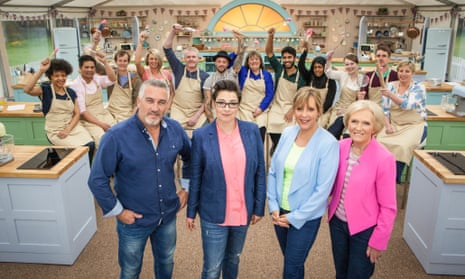
Comments (…)
Sign in or create your Guardian account to join the discussion